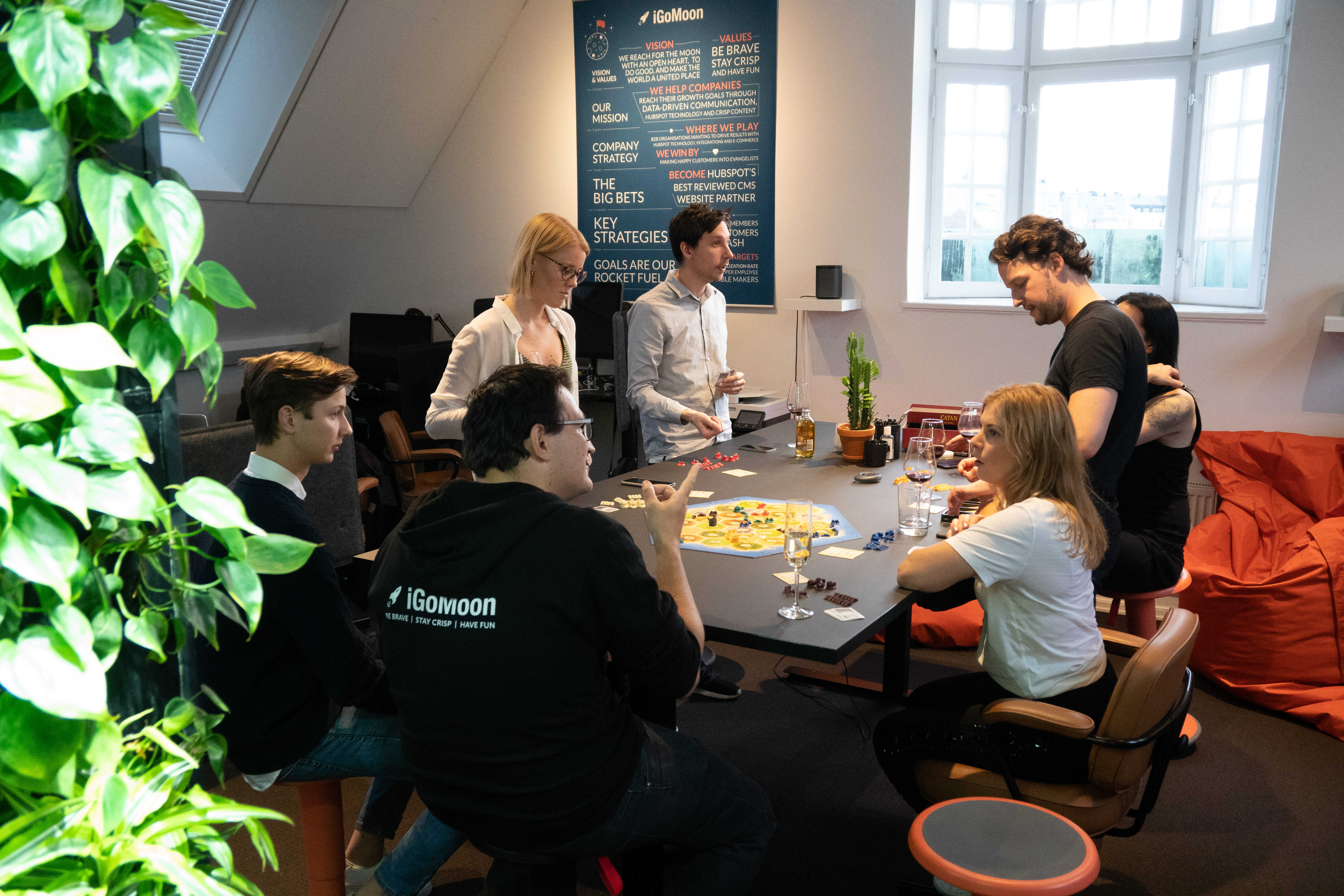Working remotely is appealing to employees for many reasons. There is little to no commute. The dress code is pretty casual. And the flexible workdays and hours that make it possible to incorporate chores, errands or travel into your days is a major plus.
It's 2021 and as the stigma about working remotely has disappeared, both employees and C-suite execs recognize the benefits of hybrid working. This is the way forward and I'd like to share my personal experience of working remotely for iGoMoon for 1 year. Some things I like, things I don't and how we and other employers can work to minimize any discomforts.

To give you a bit of background, I'm Tayla, iGoMoon's Inbound Marketing Consultant and I work fully remote in Cape Town, South Africa. The main iGoMoon office are based in Stockholm Sweden. Other than one dinner together when the crew visited cape town in 2019, I haven't been in the same room as anyone on my team in over 18 months.
1. Remote work requires lots of self-motivation
Picture your workday, priorities and deadlines. Now picture trying to execute and deliver your best solutions to them all without your manager or teammates around you.
Whether you’re home alone and the house is too quiet, or you’re home with the family and the kids are out of control, you may find it’s tough to stay on task, get your work done, and feel productive.
Working remotely will test your motivation, while your employer will still expect the same level of skilled work to be done as if you were in a physical office surrounded by resources and teammates.
If you find it difficult to execute on your goals and priorities without guidance or management keeping you accountable, working remotely is going to be an enormous challenge for you.
What you can do about it
To help you stay laser-focused on your responsibilities, I'm going to share a few ways I stay motivated while working from home.
- I create a schedule. Okay, so I'm using "schedule" very loosely here. I basically write down a to-do list of all the tasks I need to complete by the end of the day. I add one or two extras I'd like to tick off, but if they roll over to tomorrow, that's okay.
- I work in small sprints. Without a structure, things can easily get away from me. Tasks that should take 20 minutes suddenly turn into 2-hour tasks. yikes!
Blocking out small amounts of "focus time" —and planning what I'll do during that timeframe—makes big tasks feel more manageable and stops them from getting away from me. - Rewards! If I'm having an unmotivated day, I find that I work best knowing there's a little reward waiting for me on the other side. A little incentive goes a long way.
2. You will feel left out sometimes
Because I work remotely, and in Cape Town SA - I don’t get to join the team for fun activities and training sessions. Although Mattias does always take me along via zoom call - I still get FOMO for not being able to hear side conversations and be part of the atmosphere.
This is just one example of how working remotely can lead to feeling left out. Sure, software tools like Slack can help bridge the gaps, but there will be times when you miss out on news and fun banter circulating around your company. I love my dog, but let’s be real, pets aren’t the best conversationalists.
What you can do about it
I think that only you can decide how involved you want to be with your company as a telecommuter. Maybe this decision will be made for you. Many companies allow or encourage the use of Slack and other online tools to help teams stay in touch, so be sure to take advantage of these kinds of tools if they’re available to you.
Watch my "remote episode" on our vlog channel, Månresan where David Lindgren, iGoMoon's videographer, and I go into more detail on topics discussed in this blog.
3. Networking can be challenging for remote workers
Without those day-to-day in-person connections, networking can be a real challenge. I'm not just talking about finding a new full-time job. As a remote worker, you may find it more difficult to even learn about opportunities at your own growing company. Even if you follow news in your industry religiously, it’s all too easy to miss updates and announcements that could lead to profitable relationships in your future.
What you can do about it
All is not lost, friend. There are plenty of ways to stay connected online. LinkedIn groups are surprisingly good at this, so be sure to join groups that are relevant to your role and industry and really get involved in the discussion.
4. Productivity expectations may differ
One complaint I hear repeatedly from my office-bound friends is the constant interruptions of meetings, people dropping by their desk for a “quick chat,” and the countless other distractions that are part of working in any office.
I don’t have these problems. The only coworker who intrudes on my time is my dog Zara. That doesn’t mean, however, that it’s any less important for me to ensure I’m getting as much work done as I reasonably can.
Depending on your role and job description, expectations for how much you should get done each day may vary. However, it’s important that everyone agrees in terms of expectations. Just because you don’t have a morning commute anymore, does that mean you should spend that time working? Similarly, just because you don’t have any (human) coworkers to bother you, it’s unrealistic to assume you’ll be able to work all day, every day, with no interruptions.
What you can do about it
My best advice is to talk over your expectations with your manager. Be sure that you understand everything that’s expected of you as a remote worker – including hours and importantly, availability. Remember, flexible office hours does not mean endless office hours.
5. Working remotely gets lonely
I'm an extrovert. I get lonely as a remote worker.
This aspect of remote work is among the least discussed.
The loneliness felt is a double-edged sword. On one hand, solitude can be extremely helpful to your productivity. On the other, constant isolation can quickly become its own awful distraction.
What you can do about it
If you're like me and need the bustle of being around other people, even if just for two days a week, coffee shops make excellent workspaces. A little COVID remote work hack: If you’d like the bustle without the people, there are websites and music playlists that offer a coffee shop ambience.
Alternatively, you could try out a coworking space for a work-friendly atmosphere and the perks you’d expect from an office like conference rooms, refreshments, and even entrepreneur meetups to help you network (two birds with one stone).

6. Maintaining workplace and client relationships takes more effort
Building a relationship with your manager and teammates is important for any employee, and it doesn't happen overnight. Work relationships, like any relationship, develop over time through communication and establishing trust.
It’s much harder, and sometimes impossible depending on schedules, to join for meetings, lunches and networking events when you’re working remotely, and that’s valuable face-time that can take you out of a tight-knit group. So how can you minimize this?
What you can do about it
The little things count.
If you want to become more than a name on an email chain, do something as simple as change your avatar on your profile to something that lets your personality show through. Take a moment to ask how everyone is doing at the start of a conference call.
I also make a large effort to keep up informal conversations with my team by sending funny links or even work related information I think they might find helpful. I use Slack and Google Meets a lot! This is how I replicate those quick conversations I'd have while getting coffee or lunch with my teammates for example. I also have regular lunches with my teammates, where we get to know one another outside of work.
7. Creativity may take a knock
Having informal brainstorming sessions often sparks new and organic perspectives and ideas that may change the initial direction of your project but enhance its result.
The problem with the communication we have while working remotely is that it is all predictable and controlled. You get on a video call to discuss something specific. There is little space for free-flowing ideas, or things that people suddenly share that take you into a whole new direction. That creative tension that gets sparked by collaboration during an in-office brainstorm is very difficult to replicate via Slack or Zoom.
What you can do about it
As a marketer you're used to doing things on-the-fly because we are in a constant mode of adapting. To make a creative brainstorm as effective as possible, (rather than figuring-it-out-as-you-go) try prep your participants ahead of time – ideally, at least a day ahead of time.
When we book a meeting in someone's calendar, it's policy to include a short description or brief. This allows people to digest the information, do research, and come armed with questions along with any potential thought starters.
For the actual brainstorming sesssion, at iGoMoon we love to use JamBoard. It's a great way to keep everyone engaged and collab in new ways.

8. Self-learning is crucial for remote workers
Even if you’re lucky enough to work for a company like iGoMoon that actively invests in upskilling its employees, you’ll still have to be proactive with learning and honing new skills.
When I joined iGoMoon I was a total HubSpot newb. My first week felt so overwhelming. It was like everyone was speaking a different language to me (and no i'm not talking about Swedish). I really had to be a sponge and try soak up as much info as possible.
What you can do about it
Firstly, you might not have to do anything more than simply talk to your manager. If your company has skill development programs in place, it may be as simple as signing up to a course.
If you’re a consultant, however, it’s up to you and you alone to ensure you’re doing everything you can to remain professionally relevant and competitive. Fortunately, there’s no shortage of online resources available. FYI- HubSpotAcademy has countless certifications available for free!
Working remotely can be an excellent opportunity to put all that time you’re saving on your commute to good use. Be proactive about learning new skills.
9. Remote work is definitely a skill that you should hire for
Working remotely forces you to become a more skillful communicator. It also forces you to be more resourceful, especially if you’re working from an area with limited connectivity. Like me in South Africa who struggles with "Load Shedding" for example. We never know when our electricity (and therefore my lifeline to the internet) may be switched off. So it's very important for me to be prepared and communicate these issues with my team lead.
This kind of preparedness can be a desirable quality in a potential hire, as well as the strong work ethic you need to succeed as a remote worker. Communicating online has never been easier, but it takes skill to communicate well online.
What you can do about it
If you’re in charge of hiring at your company, hire for remote working as if it’s a skill – because it is.
Transitioning from a full-time in-house environment to working remotely can be a major shift for some people. Fortunately, being productive as a remote worker is a skill that can be learned. It just takes time to settle in, just like it does during those first few weeks at a new job.
10. WFH can dilute your company culture
Company culture is rightly a primary concern for many leaders. How can they reimagine their culture for a world where rituals and ceremonies enacted in the office are inaccessible, and workers have little or no face-to-face interaction with each other or their leaders? In addition to a decrease in overall satisfaction, you risk missing out on organic moments of team collaboration.
What you can do about it
Your HR staff, managers, and organization play critical roles in reinforcing your company culture while working remotely.
After team meetings, leaders should seek feedback about your company processes from your teams. You can do this through various channels. Messaging apps like Slack, email, individual meetings with employees, or online and anonymous surveys can all work well. Even if the process seems to be working, this feedback gives you greater insight into your employee experience. At iGoMoon we use OfficeVibe surveys to do just that.
At iGoMoon we also use our Slack channels openly to share what we call "Our good engaging energy nuggets". This is where each space agent shares what they are not proud of from the week before, what we learned and what they are proud of or celebrating. This is a small way we encourage everyone to live our core values - Be Brave, Stay Crisp, Have Fun.
If you're interested in working at iGoMoon and want to know more about our selection process, take a look at our careers page.
